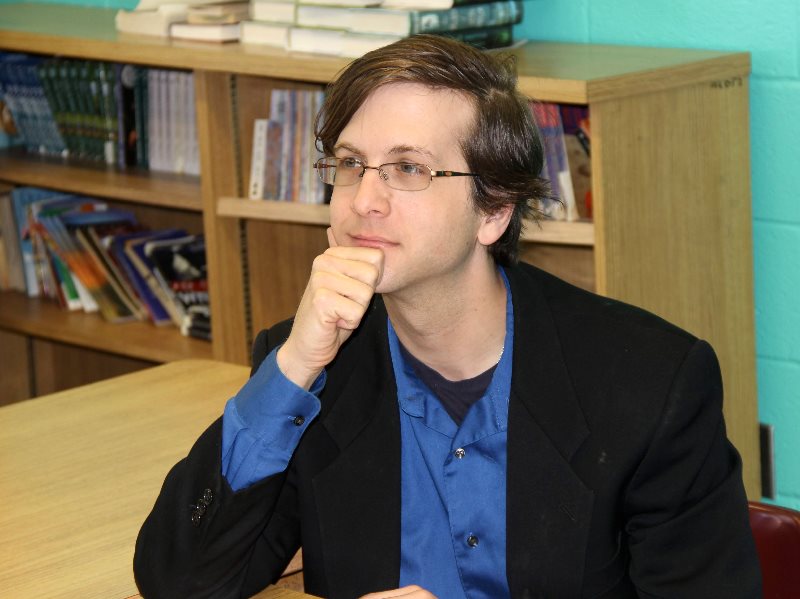
03.15.19
-Thomas Wolfe
I have to see a thing a thousand times before I see it once.
A Hundred Visions and Revisions

A self-help book I read suggests that one should not ever assume that one is right. I don't recall the last time I fully believed was right. Some part of my sessions with my therapist is running through reactions I had that I thought might be more demonstrative of mentally illness than appropriateness (though these reactions rarely went beyond my head because, of course, I didn't trust them). Often, she assures me I was wrong about being wrong, that how I felt in those moments was justified, even if I found them unpleasant.
Still, when I am suddenly upset, I credit it more to some chemical misfire in my brain than I do that I am correct in being irritated with people I love.
One such recent uncertainty was about time, which has ceased to flow at a constant rate for me. Some hours took much longer than they had any right to. Some weeks vanished. I looked to the clock and calendar and was uncertain they were right. I didn't think this was a matter of time flying because I was having fun or anything so glib. Something temporarily happened that had upset my perception, and that it would right itself if I waited and did not focus on it too hard.
Time itself had not changed. I'm not insane.
I radically accepted that this was the way my brain had decided to function and that, given how helpful technology tends to be and how assiduously I put in Amber's and my schedule into my digital calendar, I was not too bothered. I knew where I should be and when. I didn't know exactly how long that was going to take, but I had the numbers and the reminders. Maybe this was in part why I have felt more unstuck in time. Why prioritize awareness of the passage of time when I can offload it?
I didn't assume I was right, in short. There was something curious going on, and it was confined to the inside of my skull. I didn't bother checking that other people noticed this difference. It couldn't be objective.
Given the nature of my occult research, I am in contact with people who believe, despite the weirdness of thinking so, that they are right and everyone else is thus deluded. They lack that self-reflective tendency that is natural to me (or is overly active), because they have the confidence of their convictions. I don't know what makes them this way, though I question that as well.
So long as believing these things is not harmful to the person or those around them, I indulge. I used to try to keep my conversational distance, not confirming things that I found unlikely ("Oh, so there are three species of aliens fighting a vicious war in the skies above us, but they are invisible? Huh. Wacky."). Instead, I use a technique I used when teaching improvisational comedy to gifted children at Vassar: Yes, And. You must keep the scene going. If one person starts talking about how lonely it has been in this lifeboat in the middle of the ocean, the next person cannot say, "No, it is lively at this cantina in space!" The other actors in the scene affirm the reality. Likewise, when someone tells me how often they were abducted when they were seven, I nod and agree that this must have been terrifying. Do I have to rule on whether this person was abducted? No, but they are saying they believe they were, and I am going to go along with it while they are standing in front of me. Whether it is true to me, it seems true to them. Believing I was nightly violated would terrify me. They may be taking the piss, at which point I am a good sport and they tell their friends how they duped a gullible author at a street fair. There are worse ends to the story.
Those who talk to me of these things arenít going to buy a book. In my years working events, signings and readings and talks, those who want to engage me about their supernatural powers or confide who conspires against them from the shadows are not interested in my novels. They do not want something that implies that believing in goblins might not be normal.
I donít know if what they say is true for them or if this is like cosplay. If they are going through these things, they have my every sympathy. I canít imagine how hard a burden that must be and how unwarranted a stranger criticizing them would be. If I cannot trust my daily perceptions, how am I in a position to slag them off for accepting evidence I would piece together differently? They make for interesting conversations, both in the present tense and when I relate it to my friends later with a stifled snicker.
Soon in Xenology: Social Justice Wiccans. Ken.
last watched: American Gods
reading: Aliens: The World's Leading Scientists on the Search for Extraterrestrial Life
listening: Damien Rice
Your Bangarang Is on the Wrong Side ««« 2019 »»» Paradoxical Smiling